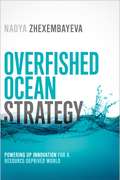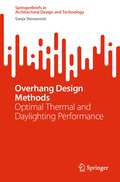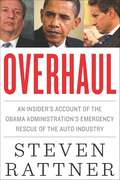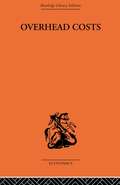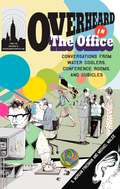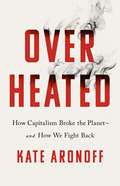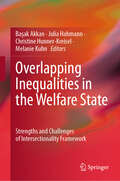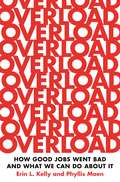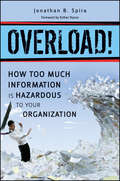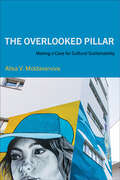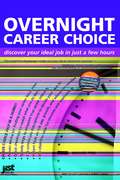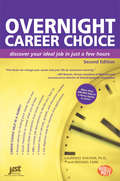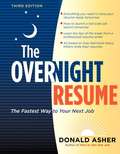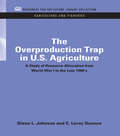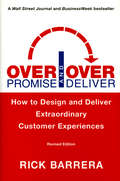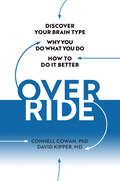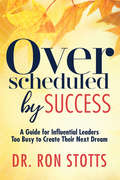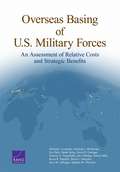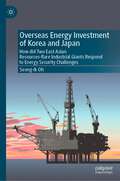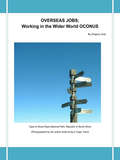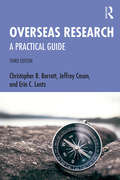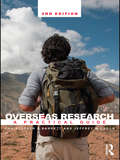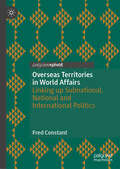- Table View
- List View
Overfished Ocean Strategy
by Nadya ZhexembayevaWe all know the proverb about teaching someone to fish, but if there are no fish left, knowing how to catch them won't do you any good. And that's the position businesses are in today. Resources are being depleted at an alarming rate and the cost of raw materials is rising dramatically. As a result, scholar and entrepreneur Nadya Zhexembayeva says, businesses need to make resource scarcity--the overfished ocean--their primary strategic consideration, not just a concern for their "green" division. Overfished Ocean Strategyoffers five essential principles for innovating in this new reality. Zhexembayeva shows how businesses can find new opportunities in what were once considered useless by-products, discover resource-conserving efficiencies up and down their value chain, transfer their expertise from physical products to services, and develop ways to rapidly try out and refine these new business models. She fills the book with examples of companies that are already successfully navigating the overfished ocean, from established corporations such as BMW, Microsoft, and Puma to newcomers such as Lush, FLOOW2, and Sourcemap. The linear, throwaway economy of today--in which we extract resources at one end, create products, and throw them away at the other--is rapidly coming to an end. In every industry, creative minds are learning how to make money by taking this line and turning it into a circle. Nadya Zhexembayeva shows how you can join them and avoid being left high and dry
Overhang Design Methods: Optimal Thermal and Daylighting Performance (SpringerBriefs in Architectural Design and Technology)
by Sanja StevanovicIt is estimated that windows in office buildings are responsible for one third of energy used for their heating and cooling. Designing window shading that balances often contradictory goals of preventing excessive heat gains in hot periods, without compromising beneficial heat gains in cold periods or visual comfort in indoor spaces of modern buildings with highly glazed facades, is an interesting multi-objective optimisation problem that represents an active research topic in the field of building energy and daylighting. Window overhangs are the simplest and most traditional shading devices that are easy to install, highly cost-effective, require low or no maintenance and offer unobstructed views outside. This book provides a review of overhang design methods for optimal thermal and daylighting performance. It starts with a historical overview of methods based on solar positions and shading masks. Next it discusses current research methodology, including shading calculation methods, ways of quantifying thermal and daylighting overhang effectiveness and the use of multi-objective optimisation approaches, together with the case studies that employ them. It further covers methods for designing innovative overhang types such as NURBS outlined overhangs and PV integrated dynamic overhangs. The appendix classifies published overhang case studies according to major climate type and latitude of their locations. As such, the book presents a valuable resource for understanding subtle nuances of interaction between solar radiation, shading devices and indoor comfort. The intended target audience are building energy researchers interested in optimisation of window shading devices.
Overhaul: An Insider's Account of the Obama Administration's Emergency Rescue of the Auto Industry
by Steven RattnerA uniquely informed investigative account of one of the biggest financial crises of President Obama’s early administrationDuring his first year in office, President Obama faced the possibility of more than a million lost jobs as GM and Chrysler headed for financial ruin. He joined forces with Treasury Secretary Tim Geithner and economic advisor Larry Summers in a historic government intervention to keep these two auto-industry giants afloat, working against a ticking clock and fielding vocal opposition from free market champions along the way. It's from this vantage point that former New York Times financial journalist Steven Rattner witnesses a new administration's grace under pressure in the face of gross corporate mismanagement—a scenario rich in hard-earned lessons for managers and executives in any industry.
Overhead Costs: Some Essays in Economic Analysis (Routledge Library Editions Economics #VI)
by W. Arthur LewisProfessor Lewis is to be congratulated upon being among the first economists to tackle the tricky subject of controlling the nationalised industries."Financial Times This book analyses some of the difficulties of costing and price formation that arise out of the existence of overhead costs in nationalised industry. Issues such as the law relating to monopoly and the accountability of public enterprise are considered, along with complex questions such as price formation and the problem of policy in public corporations.
Overhead Reduction Task Force
by John J. Gabarro J. Richard Hackman Ruth WagemanA middle manager is about to meet with his boss to discuss her request that he head up a task force to determine how overhead can be reduced by 20%. He must decide what to address in that meeting and how the task force should be launched and led. The focus is on team leadership at four stages in a team's life cycle: 1) preparation, 2) initial meeting, 3) mid-course consultation, and 4) post-performance debriefing. A rewritten version of an earlier case.
Overheard in the Office
by S. Morgan Friedman Michael MaliceThe office is no place for dirty, personal, inappropriate talk - but that doesn't stop most people. From the loading dock to the ladies' room, this compelling collection presents some of the most bizarre, shocking and hilarious real life conversations overheard in workplaces around the world. Overheard in the Office takes the best quotes from the popular website overheardintheoffice. com, as well as 20% new content which is not available online. If readers love hit show The Office, they'll love this book!
Overheated: How Capitalism Broke the Planet--And How We Fight Back
by Kate AronoffThis damning account of the forces that have hijacked progress on climate change shares a bold vision of what it will take, politically and economically, to face the existential threat of global warming head-on.In the past few years, it has become impossible (for most) to deny the effects of climate change and that the planet is warming, and to acknowledge that we must act. But a new kind of denialism is taking root in the halls of power, shaped by a quarter-century of neoliberal policies, that threatens to doom us before we've grasped the full extent of the crisis.As Kate Aronoff argues, since the 1980s and 1990s, economists, pro-business Democrats and Republicans in the US, and global organizations like the UN and the World Economic Forum have all made concessions to the oil and gas industry that they have no intention of reversing. What's more, they believe that climate change can be solved through the market, capitalism can be a force for good, and all of us, corporations included, are fighting the good fight together.These assumptions, Aronoff makes abundantly clear, will not save the planet. Drawing on years of reporting and rigorous economic analysis, Aronoff lays out a robust vision for what will, detailing how to constrain the fossil fuel industry; transform the economy into a sustainable, democratic one; mobilize political support; create effective public-private partnerships; enact climate reparations; and adapt to inevitable warming in a way that is just and equitable.Our future, Overheated makes clear, will require a radical reimagining of our politics and our economies, but if done right, it will save the world.
Overlapping Inequalities in the Welfare State: Strengths and Challenges of Intersectionality Framework
by Christine Hunner-Kreisel Melanie Kuhn Julia Hahmann Başak AkkanThe volume stresses the relevance of the intersectionality framework in welfare state analysis by examining overlapping inequalities within the shifting institutional boundaries and organisational processes across diverse welfare settings. The volume explores the strengths and challenges of theoretical and methodological approaches to intersectionality, addressing its spatial, temporal and comparative dimensions. It, therefore, adopts a critical and process-focused approach while recognising the agency of individuals as subjects of state policies. The contributions critically build the link between intersectionality and other theoretical frameworks and research paradigms, including Marxist social reproduction theory, critical race studies, Bourdieuan analysis of class, critical geography, childhood, queer, migration, and disability studies. The contributions provide insights into the institutional realms of health, education, social services, and care work and examine state practices of racial profiling and policing in distinct welfare states. Overall, the contributions illustrate the strengths of the intersectionality framework in empirical inquiries while providing critical reflections on its limitations. Readers across a diverse array of social science disciplines will find this book valuable.
Overload: How Good Jobs Went Bad and What We Can Do about It
by Erin L. Kelly Phyllis MoenWhy too much work and too little time is hurting workers and companies—and how a proven workplace redesign can benefit employees and the bottom lineToday's ways of working are not working—even for professionals in "good" jobs. Responding to global competition and pressure from financial markets, companies are asking employees to do more with less, even as new technologies normalize 24/7 job expectations. In Overload, Erin Kelly and Phyllis Moen document how this new intensification of work creates chronic stress, leading to burnout, attrition, and underperformance. "Flexible" work policies and corporate lip service about "work-life balance" don't come close to fixing the problem. But this unhealthy and unsustainable situation can be changed—and Overload shows how.Drawing on five years of research, including hundreds of interviews with employees and managers, Kelly and Moen tell the story of a major experiment that they helped design and implement at a Fortune 500 firm. The company adopted creative and practical work redesigns that gave workers more control over how and where they worked and encouraged managers to evaluate performance in new ways. The result? Employees' health, well-being, and ability to manage their personal and work lives improved, while the company benefited from higher job satisfaction and lower turnover. And, as Kelly and Moen show, such changes can—and should—be made on a wide scale.Complete with advice about ways that employees, managers, and corporate leaders can begin to question and fix one of today's most serious workplace problems, Overload is an inspiring account about how rethinking and redesigning work could transform our lives and companies.
Overload: How Good Jobs Went Bad and What We Can Do about It
by Erin L. Kelly Phyllis MoenWhy too much work and too little time is hurting workers and companies—and how a proven workplace redesign can benefit employees and the bottom lineToday's ways of working are not working—even for professionals in "good" jobs. Responding to global competition and pressure from financial markets, companies are asking employees to do more with less, even as new technologies normalize 24/7 job expectations. In Overload, Erin Kelly and Phyllis Moen document how this new intensification of work creates chronic stress, leading to burnout, attrition, and underperformance. "Flexible" work policies and corporate lip service about "work-life balance" don't come close to fixing the problem. But this unhealthy and unsustainable situation can be changed—and Overload shows how.Drawing on five years of research, including hundreds of interviews with employees and managers, Kelly and Moen tell the story of a major experiment that they helped design and implement at a Fortune 500 firm. The company adopted creative and practical work redesigns that gave workers more control over how and where they worked and encouraged managers to evaluate performance in new ways. The result? Employees' health, well-being, and ability to manage their personal and work lives improved, while the company benefited from higher job satisfaction and lower turnover. And, as Kelly and Moen show, such changes can—and should—be made on a wide scale.Complete with advice about ways that employees, managers, and corporate leaders can begin to question and fix one of today's most serious workplace problems, Overload is an inspiring account about how rethinking and redesigning work could transform our lives and companies.
Overload! How Too Much Information is Hazardous to your Organization
by Jonathan B. SpiraTimely advice for getting a grip on information overload in the workplaceThis groundbreaking book reveals how different kinds of information overload impact workers and businesses as a whole. It helps businesses get a grip on the financial and human costs of e-mail overload and interruptions and details how working in an information overloaded environment impacts employee productivity, efficiency, and morale. Explains how information?often in the form of e-mail messages, reports, news, Web sites, RSS feeds, blogs, wikis, instant messages, text messages, Twitter, and video conferencing walls?bombards and dulls our sensesExplores what we do with informationDocuments how we created more and more information over centuriesReveals what all this information is doingTimely and thought-provoking, Overload! addresses the reality of?and solutions for?a problem to which no one is immune.
The Overlooked Pillar: Making a Case for Cultural Sustainability
by Alisa V. MoldavanovaOffering an original perspective on the sustainable-development discourse by emphasizing the importance of culture and cultural institutions in facilitating societal sustainability goals, The Overlooked Pillar conceptualizes sustainability as an institutional logic that develops in organizations and is enacted by managers of such organizations who make decisions and engage in sustainable thinking on a daily basis, leading them to reconcile current organizational realities and the need to adapt to those realities with considerations of the needs of future generations. Drawing on more than five years of research conducted on a variety of organizations within the domain of the arts and humanities, Alisa V. Moldavanova provides a framework for organizational sustainability based on the dynamic interplay of two narratives—institutional resilience and institutional distinctiveness—and identifies mechanisms and strategies adopted by managers of cultural organizations that maintain and enhance intergenerational sustainability. The broader intellectual implication of the insights offered here encompasses the critical notion that genuine long-term sustainability, the kind that secures the rights of future generations, requires sustainable stewardship today.
Overnight Career Choice: Discover Your Ideal Job in Just a Few Hours
by Michael FarrEager to find a career you'll love? Don't fret and sweat. Overnight Career Choice comes to the rescue. Discover your best career fit quickly and enjoy career success and satisfaction for years to come. Mike Farr covers the nine essential factors for defining your ideal career quickly so you won't spend months or years on the wrong career path.
Overnight Career Choice
by Laurence Shatkin Michael FarrThis book provides more than 275 job descriptions with information on each job's pay, growth, openings, education level, and skills needed. Additional information about major industries opens readers' eyes to different sectors where they may be able to build a rewarding career.
The Overnight Résumé: The Fastest Way to Your Next Job
by Donald AsherCall from a headhunter? Layoffs getting a little too close for comfort? Hear about a great new internal opportunity? Getting out of the military? Or just frustrated and wonder if you could do better someplace else? This is the definitive guide to getting you on the market fast. The third edition of The Overnight Resume has been completely revised and updated for everyone--from entry level* to the executive suite--who is serious about getting an interview and landing a job. Tip #1: Never use the term "entry level" in any resume. For hundreds more tips that suit your particular case, just look inside. Information you'll find nowhere else includes: *How to beat other jobseekers at 1,000-to-1 odds. *How to launch a full-scale job search within 24 hours. *How to access the hidden job market where the best jobs are. *What returning parents and returning prisoners have in common. *How to beat resume-sorting software! *Online resumes, HTML, scannable, and portfolio versions. *Differences between East Coast and West Coast resume styles. *How to look like a local, from anywhere in the country! DONALD ASHER is the author of ten books on the topics of careers and higher education. He is a contributing writer for the San Francisco Chronicle, the Wall Street Journal's CareerJournal.com and CollegeJournal.com, USAirways Magazine, MSN Encarta and MSN homepage, Dow Jones's National Business Employment Weekly and Managing Your Career magazines, and many other publications and career sites.
The Overproduction Trap in U.S. Agriculture: A Study of Resource Allocation from World War I to the Late 1960's (RFF Agriculture and Fisheries Set)
by Glenn Johnson C Leroy QuanceThis book emphasizes resource use and efficiency in the agricultural sector and offers facts and analytical concepts of interest to welfare economists, sociologists, and agricultural policy makers. Originally published in 1972
Overpromise and Overdeliver (Revised Edition)
by Rick BarreraThe Wall Street Journal and BusinessWeek bestseller-fully revised and updatedThe old cliché is that smart companies underpromise and overdeliver. But in today's crowded market, underpromising is a ticket to oblivion. Companies like American Girl, Best Buy, and Apple came out of nowhere to dominate their markets. How did they scoop their bigger and wealthier competition? It wasn't through a fat marketing budget. It was because they made, and kept, dangerously ambitious promises. In fact, they overpromised to lure customers in-and then overdelivered to keep them. Rick Barrera shows how to make sure that every point of contact between your company and its customers is well executed and fulfills an over-the-top brand promise, to drive word of mouth and rapid growth.
Override: Discover Your Brain Type, Why You Do What You Do, and How to Do it Better
by Connell Cowan PhD David Kipper MDBased on today&’s breakthrough science into neurotransmitters, Override reveals a clear path to overcoming bad habits that sabotage our success in career, love, and healthy living. Why, when we all want to live healthy and vital lives, do we so often botch it up? Why do we make decisions that negatively impact our work, relationships, and lifestyles? Why do our brains always seem to get in the way of our goals? The answer lies in our brain chemistry. Virtually all of us suffer from an imbalance in either serotonin or dopamine—neurotransmitters that send signals through our nervous system. Shields, deficient in serotonin, unconsciously seek to avoid the discomfort or an over-stimulated nervous system, while Swords, deficient in dopamine, tend to feel under-stimulated and look for ways to create sensation. The coping styles we revert to under stress, depending on our type, have evolved to help us survive. But they are also the root cause of our most destructive and stubborn behaviors, from risk aversion to gambling. The good news is that these behaviors can be modified. In this illuminating book, readers will first identify their personal neurotype through an easy and accurate test. Then, through focused strategies, they&’ll learn how to understand their vulnerabilities and break out of self-defeating patterns to make meaningful change. Combining groundbreaking research with inspiring real-life stories of struggle and transformation, Override provides a practical, easy-to-grasp, yet revolutionary framework for achieving the life you really want.
Overscheduled by Success: A Guide for Influential Leaders Too Busy to Create Their Next Dream
by Dr. Ron StottsOverscheduled by Success is a 5-step proven process for influential leaders to reclaim their time and take their life and work to the next level. Many influential leaders are doing great things and making a real difference in the world. But these leaders often find that they're too busy to accomplish some of their most important personal and professional goals. Many begin wondering if they are actually getting the level of results they're looking for. Instead of feeling joyful and inspired, their demanding schedule often leaves them feeling tired and frustrated rather than being able to enjoy the process. Inside, Dr. Ron Stotts shows leaders how to accomplish their highest goals while taking even better care of themselves by:Reclaiming their time so they can do what matters most.Discovering the truth about what it is that they actually keep bumping up against. (Note: This is probably not what many think it is, and that's actually good news!) Bringing a whole new level of balance, inspiration, and creativity into their life and work. Learning how to avoid wasting their time, money, and effort on fleeting life improvements and instead, implement lasting change. Turning their current struggle into the most fulfilling journey of their life. For influential leaders looking for a deeper solution to their time problem, Overscheduled by Success is the guide to follow.
Overseas Basing of U.S. Military Forces: An Assessment of Relative Costs and Strategic Benefits
by Michael J. Lostumbo Michael J. Mcnerney Eric Peltz Derek Eaton David R. Frelinger Victoria A. Greenfield John Halliday Patrick Mills Bruce R. Nardulli Stacie L. Pettyjohn Jerry M. Sollinger Stephen M. WormanThis independent assessment is a comprehensive study of the strategic benefits, risks, and costs of U. S. military presence overseas. The report provides policymakers a way to evaluate the range of strategic benefits and costs that follow from revising the U. S. overseas military presence by characterizing how this presence contributes to assurance, deterrence, responsiveness, and security cooperation goals.
Overseas Energy Investment of Korea and Japan: How did Two East Asian Resources-Rare Industrial Giants Respond to Energy Security Challenges
by Seong-ik OhUnder the contraction of global energy supply brought on by geopolitical situation, this timely book addresses how resource-scarce developing countries respond to challenges in energy security. In particular, for countries underpinning efforts for an autonomous supply of energy, either oil/natural gas, nuclear power or renewable energy, this book revisits the evolution of overseas energy investment of two industrial giants in East Asia, Korea and Japan. It will provide meaningful lessons of how the state sets up policies and navigates political procedures for energy security. While a historical case study, it also offers its readers new insight into the international energy market by taking the stark déjà vu in its repetitive nature and putting it into context. The book provides an in-depth study highlighting the differences in political systems which led to contrasting outcomes. The one with a small number of veto players succeeded in establishing and expanding state-owned oil companies while producing policy inconsistency at the same time and vice versa. This comprehensive review of East Asian politics will add value to East Asian Studies by presenting a new approach through a universal theory rather than cultural uniqueness. As a readable case study on energy security, this book will be an essential reference for scholars, policymakers, industry insiders and citizens who are interested in how nations respond to historic challenges in a political and international context.
Overseas Jobs: Working in the Wider World Oconus
by Gregory UnckOvereas Jobs: Working in the Wider World OCONUS is a guide to seting goals in general, and specifically setting and accomplishing the goal of living and working OCONUS (Outside the Continental United States.
Overseas Research: A Practical Guide
by Christopher B. Barrett Jeffrey Cason Erin C. LentzWhen conducting research in developing countries, an ability to negotiate a bewildering array of cultural and logistical obstacles is essential. Overseas Research: A Practical Guide distills essential lessons from scores of students and scholars who have collected data and done fieldwork abroad, including how to prepare for the field, how and where to find funding for one’s fieldwork, issues of personal safety and security, and myriad logistical and relational issues. By encouraging researchers to think through the challenges of research before they begin it, Overseas Research will help prepare fieldworkers for the practical, logistical, and psychological considerations of very demanding work, help save valuable time, make the most of scarce financial resources, and enhance the quality of the field research. This third edition contains new material on social media, including representation of research subjects/collaborators, students’ digital branding and image, and representing universities abroad when posting publicly. It also covers emerging technologies such as solar panels for power in remote locations, new ways of digitally sending and receiving money, and incorporates more perspectives of women, LGBTQ+ people, and people of color researching abroad. The book will be of interest to overseas fieldworkers, and also to undergraduates in subjects such as anthropology, economics, geography, history, international studies, politics, sociology, and development studies.
Overseas Research II: A Practical Guide
by Christopher B. Barrett Jeffrey CasonResearchers in developing countries often find that the particular country in which they work presents a range of unforeseen challenges. Indeed, their ability to carry out effective scholarship is often highly dependent on these factors. The great differences between working in countries as varied as India, China, Bolivia and Kenya can often come as a shock to the system. An ability to negotiate a bewildering array of cultural and logistical obstacles is therefore essential. Overseas Research II: A Practical Guide distils essential lessons learned by scores of students and scholars who have collected data and done fieldwork abroad. The authors fill the reader in on the many crucial pieces of advice: how to prepare for the field, how and where to find funding for one’s fieldwork, issues of personal safety and security, and myriad logistical and relational issues that often define one’s research experience abroad. As Christopher B. Barrett and Jeffrey Cason suggest, "Fieldwork is a sequence of decisions, some about the conduct of research, some about the conduct of life." The book focuses new field researchers’ attention on that productive intersection, and includes many real-life accounts from experienced professionals whose own work abroad can inform those facing the field for the first time.
Overseas Territories in World Affairs: Linking up Subnational, National and International Politics
by Fred ConstantThis book provides an updated analysis of political developments in a sample of overseas territories of France, the United States, China, Denmark, the Netherlands, Russia, the United Kingdom, Portugal, Spain and New Zealand. Ranging from Guam, Diego Garcia or New Caledonia/Kanaky to Greenland/Kalaallit Nunaat, Sakhalin, Kuril or Puerto Rico and other territories located all over the globe, these subnational island jurisdictions deserve attention because they lie at the intersection of many evolving issues such as decolonisation, self-determination, post-colonialism, globalisation, climate change, patterns of innovative governance. Moreover, they offer occasional “hotspots” for analysing international rivalries, conflicts related to illegal migration, disputes pertaining to the delimitation of exclusive economic zones (EEZ) and clashes between mainlands and islands. In addition, they provide fascinating case-studies to grasp the interplay of subnational, national and international politics, particularly in the age of the strategic shift towards the Indo-Pacific. Fred Constant reveals the extent to which these invisible dots on the map may matter in contemporary world affairs.
